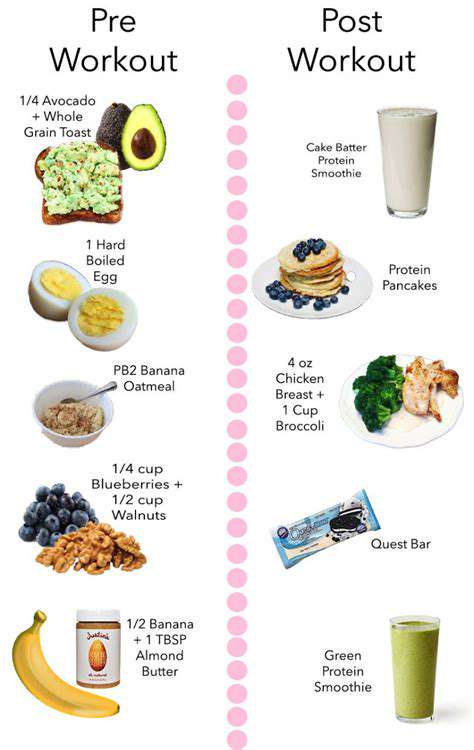High Protein Snacks: Fuel Your Workouts
Carbohydrates are the body's primary source of energy. They are broken down into glucose, which is used by cells for various metabolic processes. Complex carbohydrates, found in whole grains, fruits, and vegetables, provide sustained energy release and essential nutrients. Simple carbohydrates, while providing quick energy, often lack the nutritional benefits of their complex counterparts.
Prioritizing complex carbohydrates over simple ones is a critical aspect of a healthy diet. This choice ensures a steady supply of energy and a broader range of essential vitamins and minerals.
Proteins: Building Blocks of the Body
Proteins are essential for building and repairing tissues, producing enzymes and hormones, and supporting immune function. They are composed of amino acids, some of which the body can produce, and others that must be obtained through dietary sources. Choosing lean protein sources, such as poultry, fish, beans, and lentils, is important for maintaining optimal health.
Sufficient protein intake is crucial for muscle growth and repair, particularly important for athletes and individuals seeking to maintain a healthy weight. High-quality protein sources contribute to overall well-being and promote satiety, making them an integral part of a balanced diet.
Fats: Essential for Various Functions
Fats are crucial for hormone production, nutrient absorption, and maintaining healthy cell membranes. Unsaturated fats, found in avocados, nuts, and olive oil, are generally considered healthier than saturated fats, which are often found in processed foods and animal products. Balancing fat intake is essential for optimal health, acknowledging the distinct roles of different types of fats.
A balanced approach to fat intake is important for overall health, ensuring the body receives the necessary fats for optimal function while avoiding excessive consumption of unhealthy fats. Understanding the types of fats and their impact on the body is critical for making informed dietary choices.
Choosing the Right Macronutrient Balance
Finding the right balance of macronutrients is crucial for achieving individual health goals. This involves considering factors such as activity level, age, and overall health status. Consulting with a registered dietitian or healthcare professional can provide personalized guidance on creating a macronutrient plan that meets individual needs.
Understanding your specific needs and goals is vital to developing a sustainable and effective macronutrient strategy. Creating a balanced approach is key to maximizing health and well-being.
Beyond the Workout: Daily Protein Snacking Strategies

Understanding Protein's Role in Daily Life
Protein is far more than just a muscle-building nutrient; it plays a crucial role in virtually every bodily function. From repairing tissues to supporting immune function, protein is essential for overall health and well-being. Understanding its multifaceted importance in daily life is key to maximizing its benefits.
Beyond the obvious muscle-building aspects, protein contributes to the production of enzymes and hormones, crucial for regulating various bodily processes. This constant maintenance and repair work demands a consistent supply of protein throughout the day.
The Importance of Protein Timing
While the total daily protein intake is important, the timing of protein consumption can significantly impact its effectiveness. Consuming protein consistently throughout the day, rather than in large doses just before or after exercise, can lead to improved muscle protein synthesis and better overall results.
Strategic protein intake, spread across meals and snacks, can optimize the body's ability to utilize this vital nutrient. This approach ensures a steady supply for repair, growth, and other essential processes.
Protein Sources and Variety
A diverse range of protein sources is crucial for a balanced diet. Lean meats, poultry, fish, eggs, dairy products, legumes, and nuts are all excellent sources. Including a variety of these in your diet ensures you're getting a range of essential amino acids.
Choosing lean protein sources is important for managing calorie intake. Prioritizing foods like fish and beans will help you meet your protein needs without excessive saturated fat or cholesterol.
Protein and Weight Management
Protein plays a significant role in weight management due to its impact on satiety. Foods rich in protein often lead to feeling fuller for longer, potentially reducing overall calorie consumption. This can be especially helpful in managing hunger and cravings.
Protein's role in promoting satiety is a key factor in weight loss and maintenance efforts. By including adequate protein in your diet, you can potentially support your weight management goals.
Protein's Impact on Muscle Growth and Repair
Protein is essential for muscle growth and repair. After exercise, your body needs protein to rebuild and strengthen muscle tissue. Providing your body with adequate protein after workouts can accelerate this process.
Consistent protein intake, especially after exercise, is crucial for optimal muscle growth and repair. This is fundamental for athletes and those looking to improve their physique.
Protein's Role in Overall Health
Protein's impact extends beyond muscle building and weight management. It supports a healthy immune system and contributes to the production of various enzymes and hormones. Sufficient protein intake is essential for maintaining overall well-being.
Protein is a cornerstone of a healthy diet, supporting immune function and maintaining optimal bodily processes. Ensuring you get enough protein daily is a key aspect of a healthy lifestyle.